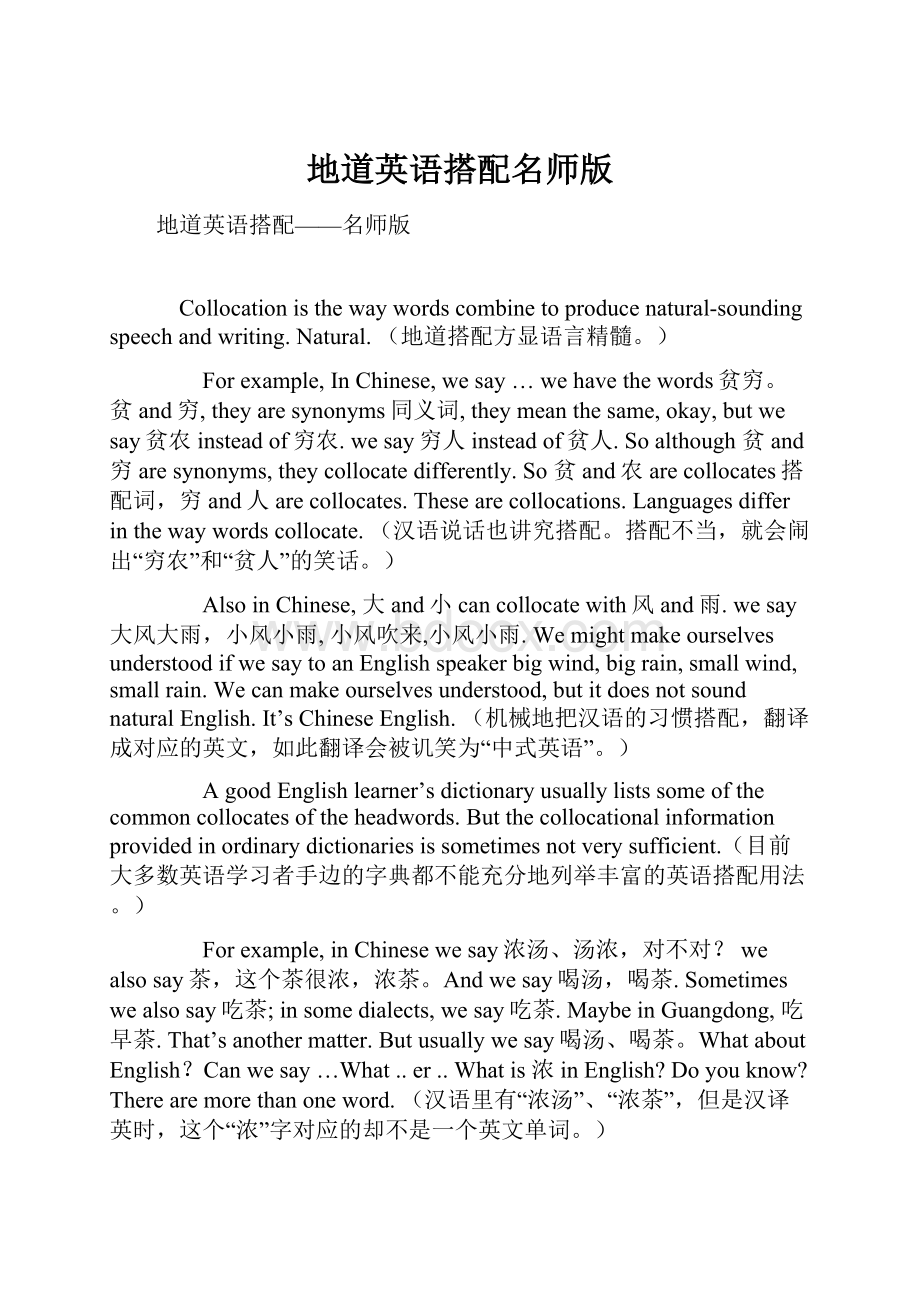地道英语搭配名师版.docx
《地道英语搭配名师版.docx》由会员分享,可在线阅读,更多相关《地道英语搭配名师版.docx(13页珍藏版)》请在冰豆网上搜索。

地道英语搭配名师版
地道英语搭配——名师版
Collocationisthewaywordscombinetoproducenatural-soundingspeechandwriting.Natural.(地道搭配方显语言精髓。
)
Forexample,InChinese,wesay…wehavethewords贫穷。
贫and穷,theyaresynonyms同义词,theymeanthesame,okay,butwesay贫农insteadof穷农.wesay穷人insteadof贫人.Soalthough贫and穷aresynonyms,theycollocatedifferently.So贫and农arecollocates搭配词,穷and人arecollocates.Thesearecollocations.Languagesdifferinthewaywordscollocate.(汉语说话也讲究搭配。
搭配不当,就会闹出“穷农”和“贫人”的笑话。
)
AlsoinChinese,大and小cancollocatewith风and雨.wesay大风大雨,小风小雨,小风吹来,小风小雨.WemightmakeourselvesunderstoodifwesaytoanEnglishspeakerbigwind,bigrain,smallwind,smallrain.Wecanmakeourselvesunderstood,butitdoesnotsoundnaturalEnglish.It’sChineseEnglish.(机械地把汉语的习惯搭配,翻译成对应的英文,如此翻译会被讥笑为“中式英语”。
)
AgoodEnglishlearner’sdictionaryusuallylistssomeofthecommoncollocatesoftheheadwords.Butthecollocationalinformationprovidedinordinarydictionariesissometimesnotverysufficient.(目前大多数英语学习者手边的字典都不能充分地列举丰富的英语搭配用法。
)
Forexample,inChinesewesay浓汤、汤浓,对不对?
wealsosay茶,这个茶很浓,浓茶。
Andwesay喝汤,喝茶.Sometimeswealsosay吃茶;insomedialects,wesay吃茶.MaybeinGuangdong,吃早茶.That’sanothermatter.Butusuallywesay喝汤、喝茶。
WhataboutEnglish?
Canwesay…What..er..Whatis浓inEnglish?
Doyouknow?
Therearemorethanoneword.(汉语里有“浓汤”、“浓茶”,但是汉译英时,这个“浓”字对应的却不是一个英文单词。
)
ActuallytheChinesewords浓茶,浓汤thesetwo浓arenotthesame.Although…Although…we…Ifwedonotpayattention,wemightthinktheyarethesame.Butifwewanttofindtheantonymswewillknowthesetwo浓aredifferent.Theopp-..Theoppositeof浓汤is稀汤.Theoppositeof浓茶isnot稀茶.It’s淡茶,清茶.Soweknow浓therearetwo...theword浓inChinesehastwomeanings.SoinEnglishtheymakeadifferencebetweenthesetwowords.(虽然“浓汤”和“浓茶”所用的都是同一个“浓”字,但是“浓汤”的反义词是“稀汤”,而“浓茶”的反义词是“淡茶”。
由此可见,同一个“浓”字具有两个不同的含义。
翻译成英文的时候,“浓”也应该对应为两个不同的单词。
)
ButhowdoweknowwhatEnglishwordscollocatewith茶and汤?
Teaandsoup.Wecanconsultthecollocationdictionariesandseewhatittellsus.Thisiswhatittellsusinthecollocationdictionary,theOxfordCollocationDictionary.(为大家推荐一本专门侧重英语搭配的字典,即"OxfordCollocationsDictionaryforStudentsofEnglish"《牛津英语学生搭配词典》,目前这个字典在卓越网有售
Let’slookattheword“soup”.Soupisanoun.Andusuallyitgivestwokindsofcollocations:
adjectivesandverbs.(通过翻阅上面提到的《牛津英语学生搭配词典》,翻到"soup"页,我们可以看到与"soup"搭配的可以是名词和动词。
)
(soup在英语搭配字典中的解释显示如下:
soupnoun
·ADJ.chunky,creamy,hearty,thick[…]
·VERB+SOUP[…]haveWehadacoldcucumbersoupasastarter.|drink,eat(Eatisthenormalverbwhenthesoupisservedinabowel.))
Soweknowtheadjectives“chunky,creamy,hearty,thick”collocatewithsoup.Whatischunkysoup?
Soup里头有很多块儿,有很多菜、肉成块的。
Creamy?
粘粘的,奶油味很足的。
Hearty?
Ibetyoudon’tknowthewordheartysoup.Hearty丰盛的,有很多好东西在里面heartysoup,andthicksoup.Soweknowtheword“thick”collocateswithsoup.(我们可以学到与soup搭配的几个形容词,从中,我们发现“浓”字可以用"thick"来形容。
)
Howaboutverbs?
Theverbthatcollocateswithsoupishave.Thefirstishave.Wehadacoldcucumbersoupasastarter.饭前的一个starter.Thendrink,eat.Wecandrinksoupandeatsoup.Andveryimportantly,itsayseatisthenormalverbwhenthesoupisservedinabowl.放在一个碗里,盛在碗里的soup,thentoeatsoupisanormalverbratherthantodrink.(soup可以与动词have,drink和eat搭配。
其中,饮用盛在碗里的汤,要用动词eat。
)
(tea在英语搭配字典中的解释显示如下:
teanoun
·ADJ.[…]stewed(=verystrong),strong|weak|cold[…]
·VERB+TEAdrinkIdon’tdrinktea.|have|sip,swallow[…])
Andlet’slookattea.Theadjectivesthatcollocatewithteaarestewed.煮得很浓的,ifyouboil,thentheteaisverystrong.Notboiledteabutstewedtea.Strongtea,weaktea,coldtea,etc.Soweknow浓茶isnotthickbutstrong.(我们可以学到与tea搭配的几个形容词:
stewed,strong,weak,cold。
其中,“浓茶”用"strong"来形容。
)
Andtheverbsthatcollocatewithtea?
Drink.Idon’tdrinktea.Have,I’mhavingtea.Sip抿一抿、尝一尝、小口喝,swallow咽.Thesearecommonverbsthatcollocatewithtea.Sofromthesetwoentries,wecanseeEnglishpeoplesaythicksoupbutstrongtea.Theysaydrinkorhaveteaorsoup.(tea可以与动词drink,have,sip和swallow搭配。
)
Butifthesoupisservedinthebowl放在碗里,theynormallysay“eatsoup”.Why?
Because…MaybebecauseEnglishpeopleatthedinnertabledonotnormallyholdupthesoupbowlanddrinkitdirectlyfromthebowl.Theythinkitisnotgoodtablemanners.(前文提到过,英语很少说drinksoup,而是说eatsoup。
这主要同他们的餐饮文化与习俗有关。
)
Actuallyitisnotdifficulttoimagine.Forexample,plate盘子,wedonotnormallyholdupaplateandeat,right?
ToEnglishpeople,asoupbowlissomethinglikeaplate.Youhavetouseyourspoonandtoeatthesoupspoonfulbyspoonful.一勺一勺地喝。
Theyconsideritillmanneredtodrinkitdirectlyfromthesoupbowl.(因为他们习惯于拿着勺子舀汤喝,而不是端着碗直接灌,所以他们把喝汤称作eatsoup。
)
AswedonotliveinanEnglishenvironment,ourknowledgeofEnglishcollocationsisoftenratherlimited.TospeakandwritenaturalEnglish,owningandconsultingacollocationdictionaryisessential.Suchinformationusuallyisnotprovidedinotherdictionaries,eveninChinese-Englishdictionaries.Andalsothisconcerns…thisconcernstheculturaldifferencebetweenEnglish-speakingcountriesandChinesecountries.Ithinktothem,theycandrinkdirectlyfromacuporglass…glasses.Onlysuchutensils这种容器youcanuseittodrinkfromdirectly.(单词搭配的差异从侧面反映出中外文化的差异。
如果你没有在英语环境中生活过,你是很难接触到地道的英语搭配的。
这时候,一本英语搭配字典将成为你的好帮手。
)
着重强调的几组英语搭配用法:
浓茶:
strongtea
浓汤:
thicksoup
喝茶:
drink/havetea
喝汤:
eat/havesoup
美国人眼中的中式英语——看看你说了哪一句
在各个英语学习论坛上,经常可以看到有关Chinglish(中式英语)的文章,但一般都是中国人写的。
不过我看到过一篇长文,也是有关Chinglish的,但却是美国人写的,很有意思。
这篇长文的标题是Chinglish2English(从中式英语到标准英语),作者是浙江大学的美国外教ChuckAllanson,内容则是Chuck在中国五年任教期间所听到、所看到的各种Chinglish说法。
比如Chuck第一次来中国,下飞机后,负责接待他的东北某大学英语系陈老师说:
您刚到,我们吃点饭吧。
我们要点Chinesedumpling(饺子)和Chinesebeancurd(豆腐),您看可以吗?
Chuck以前从未听说过这两种东西,但出于好奇,就说可以,结果饭菜端上来一看,原来就是ravioli(饺子,来自意大利语)和tofu(豆腐,来自日语)。
Chuck当时心里暗想,这两种东西,国际上早已经有通用的说法(ravioli和tofu),他们中国人为什么还要用那种生僻的说法呢?
以后Chuck跟陈先生混熟了,就问他,当初你为什么不说ravioli和tofu呢?
陈先生听了大吃一惊,连忙解释说,我真的不知道这两个词,而且我们的《英汉词典》上也没有这两个词。
于是Chuck开始意识到,中国的英语教师、英语课本、甚至英语词典肯定存在问题,否则不可能发生这种事情。
在中国五年的任教期间,Chuck收集了大量的Chinglish说法,从中挑选出一组最常见的,编写了上面提到的那篇长文。
下面就是这些Chinglish说法,其中每行第一部分是汉语说法,第二部分是Chinglish说法,第三部分则是英语的标准说法。
①欢迎你到...②weleyouto...③weleto...
①永远记住你②rememberyouforever③alwaysrememberyou(没有人能活到forever)
①祝你有个...②wishyouhavea...③Iwishyoua...
①给你②giveyou③hereyouare
①很喜欢...②verylike...③like...verymuch
①黄头发②yellowhair③blond/blonde(西方人没有yellowhair的说法)
①厕所②WC③men’sroom/women’sroom/restroom
①真遗憾②it’sapity③that’stoobad/it’sashame(it’sapity说法太老)
①裤子②trousers③pants/slacks/jeans
①修理②mend③fix/repair
①入口②wayin③entrance
①出口②wayout③exit(wayout在口语中是crazy的意思)
①勤奋②diligent③hardworking/studious/conscientious
①应该②should③must/shall
①火锅②chafingdish③hotpot
①大厦②mansion③center/plaza
①马马虎虎②so-so③average/fair/allright/nottoobad/OK(西方人很少使用so-so)
①好吃②delicious③good/nice/tasty/appetizing(delicious在中国被滥用)
①尽我最大努力②trymybest③try/strive(try的本意就是trymybest)
①有名②famous③well-known/renowned/legendary/popular(famous在中国被滥用)
①滑稽②humorous③funny/witty/amusing/entertaining
①欺骗②tocheat③totrick/toplayajokeon/tocon/todeceive/toripoff
①车门②thedoorofthecar③thecar’sdoor
①怎么拼?
②howtospell?
③howdoyouspell?
①再见②bye-bye③bye/seeyou/seeyoulater/later(bye-bye有些孩子气)
①玩②play③goto/do(play在中国被滥用)
①面条②noodles③pasta(noodles有些孩子气)
①据说②itissaid③Iheard/Iread/Iwastold
①等等②andsoon③etc.
①直到现在②tillnow③recently/lately/thusfar
①农民②peasant③farmer
①宣传②propaganda③information
另一个人的注释:
①黄头发②yellowhair③blond/blonde(西方人没有yellowhair的说法)
-确实只有把头发染成黄色的才有机会用到yellowhair
①厕所②WC③men’sroom/women’sroom/restroom
-这也不能全怪中国,WC(watercloset)是过时的用法,但在西方更新这词并对中国产生影响之前,WC就已经在中国普及了,要从根本上扭转已经先入为主的观念恐怕还需要点时间。
不过现在不少大型设施当中的标示已经能跟上时代的步伐。
①真遗憾②it’sapity③that’stoobad/it’sashame(it’sapity说法太老)
-这个同上,但我也觉得是有必要改进一下了。
①裤子②trousers③pants/slacks/jeans
-只能说trousers在中国有被滥用的嫌疑,trousers一般指很正式的裤子,有别于pants/jeans等,至少在英国是这样。
①修理②mend③fix/repair
-这个,我想在中国更多被使用的应该是repair才对。
①入口②wayin③entrance
①出口②wayout③exit(wayout在口语中是crazy的意思)
-这个现在应该已经得到很大改善了。
①应该②should③must/shall
-这点真的不知道从何说起。
①火锅②chafingdish③hotpot
-我倒是从没机会接触过用chafingdish的人。
①大厦②mansion③center/plaza
-并不觉得中国人就喜欢说mansion。
①马马虎虎②so-so③average/fair/allright/nottoobad/OK(西方人很少使用so-so)
①好吃②delicious③good/nice/tasty/appetizing(delicious在中国被滥用)
①尽我最大努力②trymybest③try/strive(try的本意就是trymybest)
①有名②famous③well-known/renowned/legendary/popular(famous在中国被滥用)
-嗯,是有必要更新一下了。
①滑稽②humorous③funny/witty/amusing/entertaining
-这个,应该只是某个别的错误理解吧,都不是一个意思的词。
①欺骗②tocheat③totrick/toplayajokeon/tocon/todeceive/toripoff
-这几个词的程度不一样,词义上也是有区别的,确实是有被混用的可能。
①怎么拼?
②howtospell?
③howdoyouspell?
-也许有不少人并不清楚,甚至不觉得这个是chinglish,因为貌似听到过不少老外也是这样说的。
但howtospell确实是chinglish。
原因我总结有二。
1、howtospell本身不能单独使用,只能存在于从属结构当中,如Idon'tknowhowtospell.../Canyoutellmehowtospell...,由此让我们有个错觉howtospell是很自然而然的说法;2、用简单句提这个问题的话,则要说成Howdoyouspell...,口语中多连读成How'duspell...,一不小心便很容易听成Howtospell...
①再见②bye-bye③bye/seeyou/seeyoulater/later(bye-bye有些孩子气)
-与其说bye-bye是chinglish,不如说“拜拜”是中文当中的一个外来语,这个词已经完全本土化了,是否还能算英语?
①面条②noodles③pasta(noodles有些孩子气)
-有点类似“饺子”的情况,我实在无法把pasta和noodles等同起来,这就象跟意大利人说“pasta和spaghetti都是一个东西”一样,会把人家弄得有点哭笑不得。
①据说②itissaid③Iheard/Iread/Iwastold
-itissaid一般用在比较正式的叙述当中,经常挂嘴